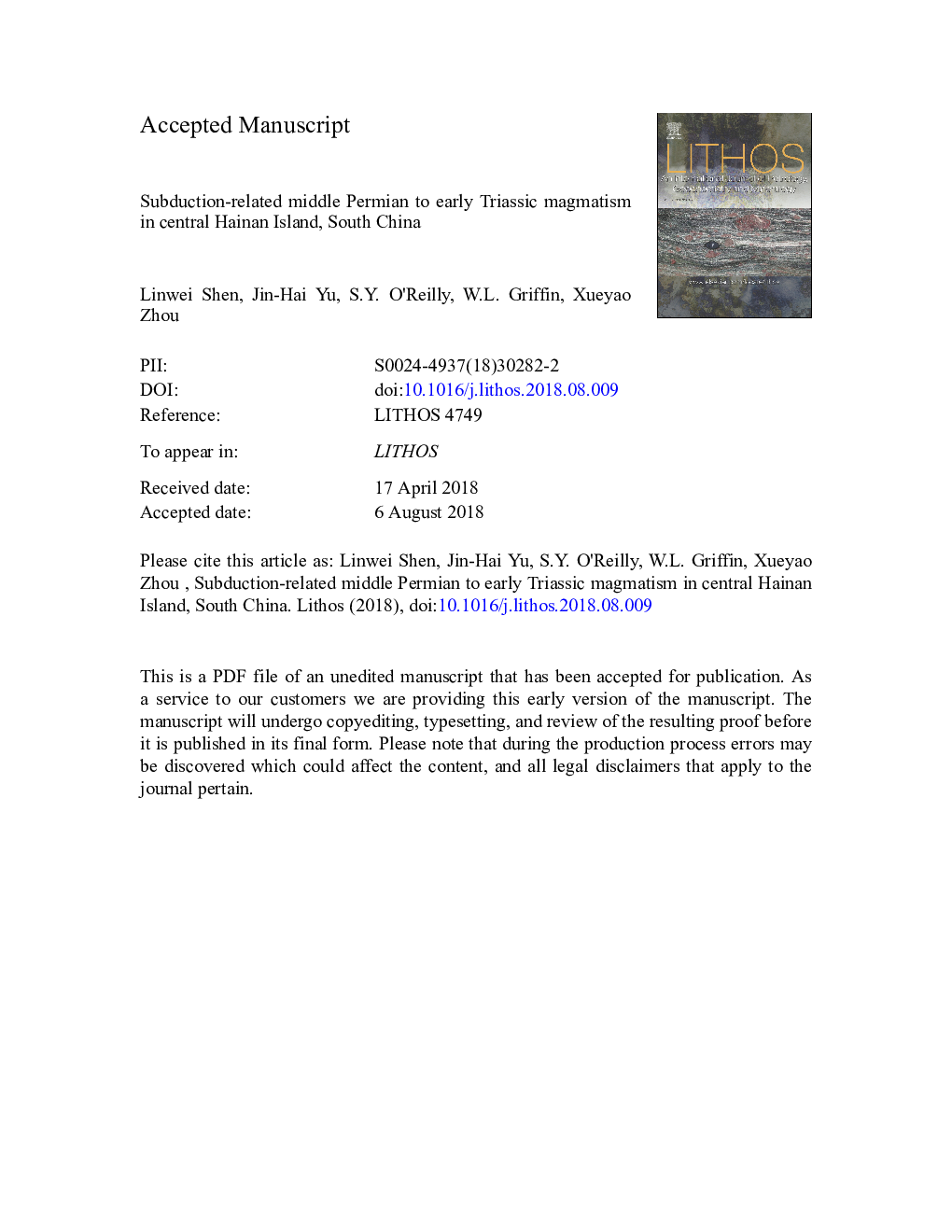| کد مقاله | کد نشریه | سال انتشار | مقاله انگلیسی | نسخه تمام متن |
|---|---|---|---|---|
| 8911501 | 1638615 | 2018 | 62 صفحه PDF | دانلود رایگان |
عنوان انگلیسی مقاله ISI
Subduction-related middle Permian to early Triassic magmatism in central Hainan Island, South China
دانلود مقاله + سفارش ترجمه
دانلود مقاله ISI انگلیسی
رایگان برای ایرانیان
موضوعات مرتبط
مهندسی و علوم پایه
علوم زمین و سیارات
ژئوشیمی و پترولوژی
پیش نمایش صفحه اول مقاله

چکیده انگلیسی
There was extensive Permian to Triassic magmatism in Hainan Island, southern part of the South China Block (SCB), which began earlier and exhibits different rock types and geochemical characteristics compared to the Indosinian magmatism in the hinterland of the SCB. Two stages of magmatism have been identified in central Hainan Island in this study. The first-stage magmatism (253-262â¯Ma) is characterized by strongly deformed granites. These gneissic granites exhibit SiO2 (64.0-69.8â¯wt%), MgO (0.97-1.60â¯wt%), Fe2O3T (2.68-6.78â¯wt%), A/CNK (most <1.1), zircon εHf(t) values (â2.08 to â0.41), the geochemical features of I-type granites. These early granites can be subdivided into high-REE and low-REE groups. Compared to the low-REE granites, the high-REE ones have higher K2O, Ba, K2O/Na2O, Gd/Yb and Th/Ta, low U, Rb/Ba, Nb/La and U/Pb. The low-REE granites show whole-rock εNd(t) (â4.33 to â3.96) and ISr (ca 0.7074), while the high-REE granites have lower εNd(t) (â7.34 to â6.33) and higher ISr (0.7096-0.7109). The gneissic granites probably derived from the partial melting of the Baoban Complex at different crustal levels. The second-stage magmatism (245-256â¯Ma) is characterized by weakly deformed to massive gabbroic-dioritic rocks. They exhibit relatively low SiO2 (48.9-59.7â¯wt%), high Fe2O3T (6.57-11.6â¯wt%), total alkalies (Na2Oâ¯+â¯K2O) (3.91-7.35â¯wt%), and variable MgO (2.74-7.05â¯wt%), Ni (3.84-60.1â¯ppm) and Cr (7.22-299â¯ppm) concentrations. They also have low whole-rock εNd(t) values (â7.92 to â5.11) and high ISr (0.7083-0.7118), and a range of zircon εHf(t) values (â5.55 to â1.11), suggesting that their parental magmas were derived from heterogeneous enriched-mantle sources, and experienced AFC processes. The rock assemblages and their geochemical features indicate that both granites and gabbroic-dioritic rocks were formed in a back-arc extensional environment, which was probably related to the subduction of Paleo-Pacific oceanic plate. Hence, the Indosinian intracontinental orogeny in the hinterland of the SCB probably was triggered by this subduction in the southeast, rather than the collision between the SCB and the Indochina Block in the southwest.
ناشر
Database: Elsevier - ScienceDirect (ساینس دایرکت)
Journal: Lithos - Volumes 318â319, October 2018, Pages 158-175
Journal: Lithos - Volumes 318â319, October 2018, Pages 158-175
نویسندگان
Linwei Shen, Jin-Hai Yu, S.Y. O'Reilly, W.L. Griffin, Xueyao Zhou,